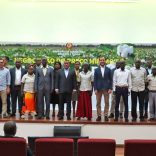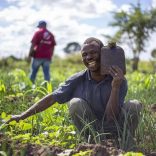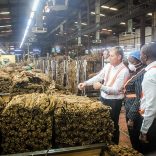Mozambique: Cotton price set at 22 meticais per kilo - Watch
Government and World Bank financing irrigation with US$57 million – Mozambique

in file CoM
The Mozambican government and the World Bank plan to invest 57 million US dollars in implementing the Project for the Development of Small Scale Irrigation and Market Access (IRRIGA).
Of this sum, 55 million dollars results from a grant approved by the World Bank in June 2018 for this project which will benefit over 40,000 households in the central provinces of Manica, Sofala and Zambezia and the northern province of Nampula.
At the official launch of the project in Maputo on Friday, Agriculture Minister Higino de Marrule said it will accelerate agricultural development. It will cover 5,500 hectares of irrigated land – 2,500 hectares of which will be rehabilitated irrigation schemes, while 3,000 hectares will be newly irrigated land.
Also under this project, 200 government staff and 100 service providers, including NGOS, will be trained in the planning and provision of agricultural services.
“We challenge the managers of IRRIGA to work flat out so that this project begins to produce positive results in modernisation and the integration of the value chain, contributing decisively to guaranteeing food and nutritional security”, declared Marrule.
For his part, the World Bank country director for Mozambique, Mark Lundell, said that financing IRRIGA is part of the Bank’s actions to support the country in diversifying its economy and in agricultural marketing.
“The World Bank has already financed various agricultural development projects in Mozambique”, Lundell said, “but with regard to irrigation, the first project in the last eight years was the project for the development of sustainable irrigation (PROIRRI), to the sum of over 70 million dollars, with the participation of the Japanese government”.
He explained that IRRIGA intends to improve the work begun by PROIRRI, contributing to expanding the area under irrigation, and increasing productivity.
He added that the project also includes critical activities seeking to transform subsistence agriculture into market-oriented agriculture.
“This includes training and supporting producers through matching grants so as to boost cultivation, production, productivity, added value and marketing”, Lundell said.
He also expected the project to contribute to reducing chronic malnutrition in beneficiary provinces. “IRRIGA will promote the production and consumption of crops with a high energy, vitamin and mineral content, such as rice and vegetables”, said Lundell. “The training programmes envisaged will include aspects concerning food and nutrition that will allow the families of farmers to maximise the nutritional benefits of their products”.












Leave a Reply
Be the First to Comment!
You must be logged in to post a comment.
You must be logged in to post a comment.